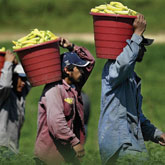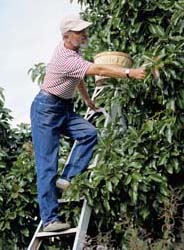
This fact sheet provides general information concerning the application of the Fair Labor Standards Act (FLSA) to agricultural employment. The FLSA is the federal law which sets minimum wage, overtime, recordkeeping, and child labor standards.
Agriculture includes farming in all its branches when performed by a farmer or on a farm as an incident to or in conjunction with such farming operations.
Coverage
Virtually all employees engaged in agriculture are covered by the Act in that they produce goods for interstate commerce. There are, however, some exemptions which exempt certain employees from the minimum wage provisions, the overtime pay provisions, or both.
Employees who are employed in agriculture as that term is defined in the Act are exempt from the overtime pay provisions. They do not have to be paid time and one half their regular rates of pay for hours worked in excess of forty per week.
Agriculture does not include work performed on a farm which is not incidental to or in conjunction with such farmer's farming operation. It also does not include operations performed off a farm if performed by employees employed by someone other than the farmer whose agricultural products are being worked on.
Any employer in agriculture who did not utilize more than 500 "man days" of agricultural labor in any calendar quarter of the preceding calendar year is exempt from the minimum wage and overtime pay provisions of the FLSA for the current calendar year. A "man day" is defined as any day during which an employee performs agricultural work for at least one hour.
Additional exemptions from the minimum wage and overtime provisions of the Act for agricultural employees apply to the following:
- Agricultural employees who are immediate family members of their employer
- Those principally engaged on the range in the production of livestock
- Local hand harvest laborers who:commute daily from their permanent residence, are paid on a piece rate basis in traditionally piece-rated occupations, and were engaged in agriculture less than thirteen weeks during the preceeding calendar year
- Non-local minors, 16 years of age or under, who are hand harvesters, paid on a piece rate basis in traditionally piece-rated occupations, employed on the same farm as their parent, and paid the same piece rate as those over 16.
Requirements

Although exempt from the overtime requirements of the FLSA, agricultural employees must be paid the minimum wage -- $5.15 an hour effective 9/1/97. There are numerous restrictions on the employment of minors less than 16 years of age, particularly in occupations declared hazardous by the Secretary of Labor. Substantial civil money penalties are prescribed for violations of the monetary and child labor provisions of the law. The FLSA also requires that specified records be kept.
Youth Minimum Wage: The 1996 Amendments to the FLSA allow employers to pay a youth minimum wage of not less that $4.25 an hour to employees who are under 20 years of age during the first 90 consecutive calendar days after initial employment by their employer. The law contains certain protections for employees that prohibit employers from displacing any employee in order to hire someone at the youth minimum wage.
Typical Problems
Not keeping/maintaining records of the names and permanent addresses of temporary agricultural employees, dates of birth of minors under age 19, or hours worked by employees being paid on a piece rate basis.
Failing to pay overtime to employees whose jobs are related to agriculture but which do not meet the definition of agriculture contained in the Act.
Agricultural employers who utilize the services of a farm labor contractor are almost always in a situation of joint employment with the contractor in regard to the employees. Joint employment means that both the contractor and the farmer are responsible for complying with the minimum wage, overtime, recordkeeping, and child labor provisions of the law. If either party fails to comply with the law both parties may be held liable.
Finally, most agricultural employers, agricultural associations, and farm labor contractors are subject to another statute, also administered by the Wage and Hour Division -- the Migrant and Seasonal Agricultural Worker Protection Act. Employers in agriculture or agriculture-related businesses should ascertain how this law applies to their operations.
 Print
Print Email
Email







